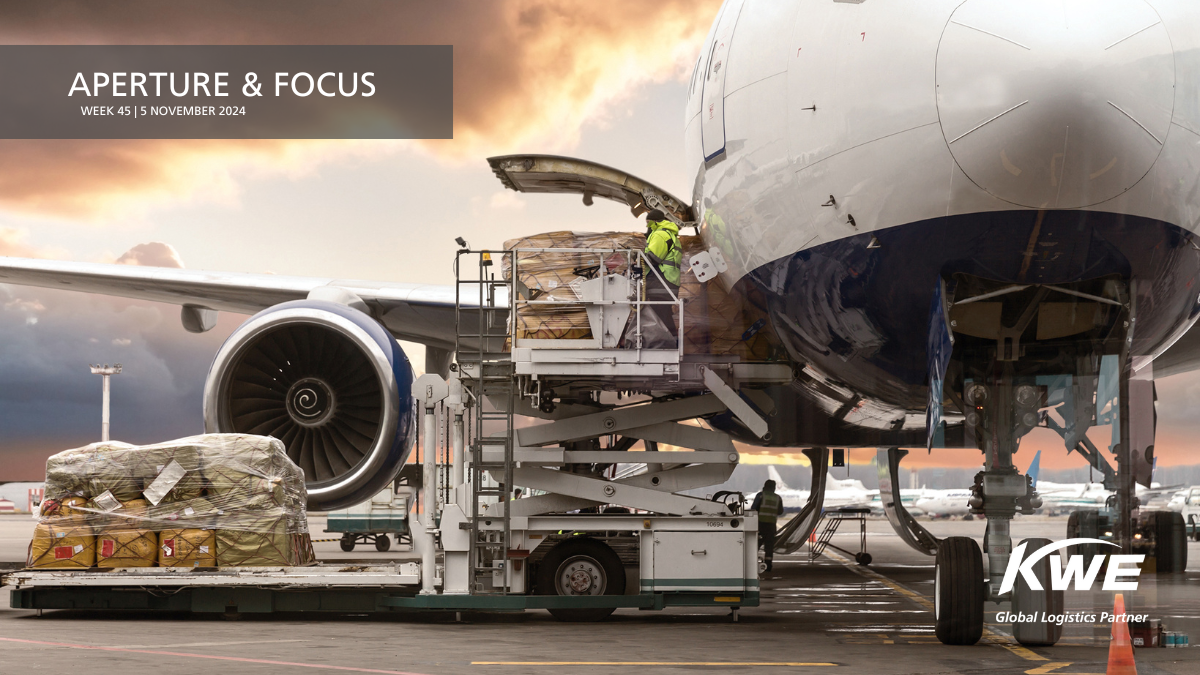Quote
Aperture & Focus: Week 45

Global Aperture
Global air cargo demand is on track for double-digit growth in 2024, with October showing an 11% increase in volumes, despite disruptions like strikes and extreme weather. Even with zero growth expected in November and December, the industry's improved preparedness and better management of disruptions by shippers, freight forwarders, and airlines will ensure steady growth through the end of the year.
Air cargo capacity shortages are expected to persist until at least 2030, driven by limited production of widebody freighters and delays in new aircraft models like the Airbus A350 and Boeing 777-8. The 2028 sustainability targets set by ICAO may also result in exemptions for older aircraft, further complicating the industry's ability to meet rising freight demand.
As the U.S. heads into presidential and congressional elections, the logistics industry is keeping a close eye on potential policy changes that could impact global operations. As the outcome shapes the global logistics landscape in terms of cost, efficiency, demand, and more, companies will need to adapt to shifts in infrastructure investment, trade policy, labor regulations, environmental standards, and technology incentives. KWE will continue to monitor these developments closely and keep our customers up to date with the latest information.
Regional Focus
Americas
United States: For the first time in over six decades, U.S. freight rail companies are taking distinct approaches to managing labor relations. Union Pacific and Norfolk Southern have shifted toward collaboration with unions to address worker issues, while BNSF and CSX are choosing a more traditional, contract-focused strategy. This split highlights a shift in the rail industry’s approach to balancing operational needs with labor partnerships.
Canada: Labor tensions at Canada’s ports have escalated, causing significant disruptions for shippers. On the west coast, the British Columbia Maritime Employers Association (BCMEA) locked out International Longshore and Warehouse Union (ILWU) Local 514 workers at the port of Vancouver on November 4th, impacting operations at member terminals, though some activities, like grain and cruise operations, continue.
Meanwhile, CUPE Local 375's unlimited strike at the Termont terminals in Montreal, which began on October 26th, has blocked 40% of container traffic, leading the Maritime Employers Association to suspend salary guarantees for non-working longshore workers starting November 5. Ongoing negotiations are stalling, raising concerns about further disruptions.
Asia-Pacific
Asian ports, including Shanghai and Ningbo in China and Kaohsiung in Taiwan, are dealing with heavy congestion after Typhoon Kong-Rey, which hit Taiwan with the strongest winds since 1996. Vessel delays are severe, with Kaohsiung seeing a 100% delay rate for incoming ships, while Shanghai and Ningbo report over 80% delays; despite recent rate hikes, liner operators may face pressure to reduce freight rates if vessel utilization doesn’t recover soon. While limited impact to air freight has been reported, at least 24 flights were diverted from Taoyuan Internation Airport in Taiwan to Hong Kong International Airport as the typhoon made landfall.
China: Territorial confrontations in the South China Sea, primarily involving China and Southeast Asian nations like the Philippines, Vietnam, Malaysia, and Brunei have intensified, raising concerns about disruptions to global trade. With approximately 24% of the world’s maritime trade passing through this region, increased tensions and potential incidents involving naval vessels could significantly impact supply chains and trade flows, highlighting the importance of stability in this key maritime corridor.
India: The Indian government is addressing the container shortage by having the Shipping Corporation of India (SCI) acquire at least five more container ships to increase capacity. Additionally, the Jawaharlal Nehru Port Authority (JNPA) is setting up a centralized coordination system to manage the use of empty containers across major ports, including Jawaharlal Nehru Port and Mumbai, to improve availability and streamline logistics.
Europe, Middle East & Africa
Germany: Hamburg's Container Terminal Altenwerder (CTA) is experiencing significant congestion due to HHLA's ongoing modernization efforts, including the replacement of all 14 ship-to-shore cranes. This has led carriers, such as Hapag-Lloyd, to reroute vessels to alternative ports like Wilhelmshaven to maintain schedule reliability.
South Africa: According to KWE internal sources, South African ports continue to face significant operational challenges, with Durban battling landside congestion and port booking limitations despite newly implemented operational changes. Cape Town recently resumed waterside operations after a three-day delay due to strong winds, though landside congestion remains critical, and Coega Port, now a main transshipment hub, reports up to eight-day delays due to increased container traffic and technical issues.